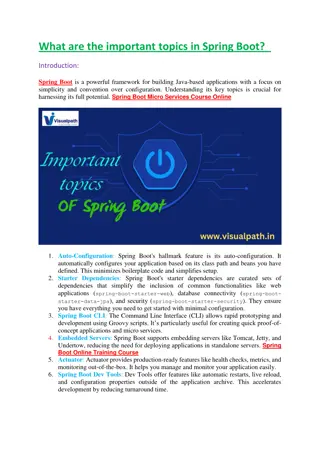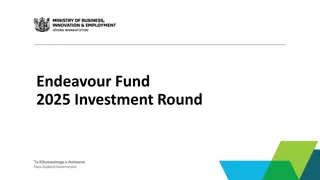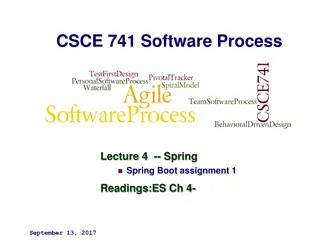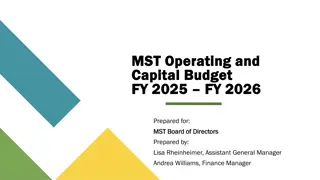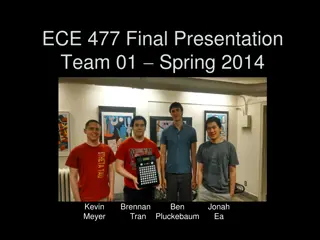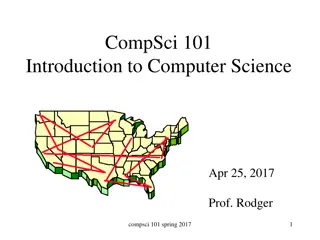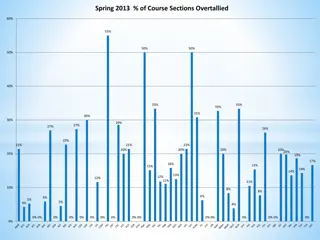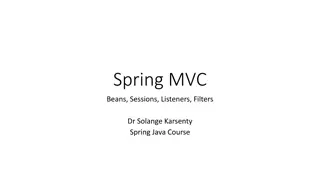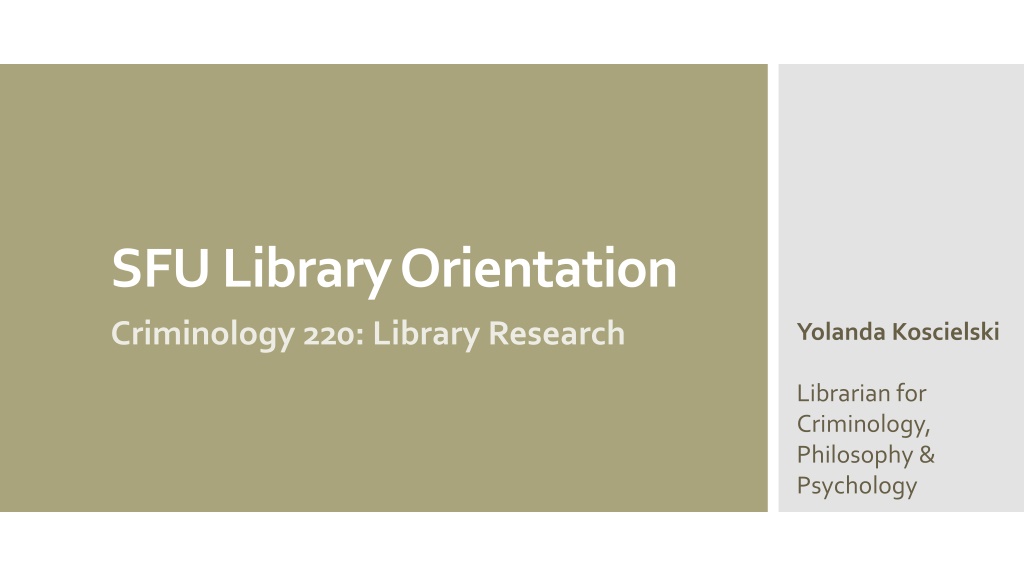
SFU Library Research Guide for Criminology Students
Explore the comprehensive resources and services offered by SFU Library for criminology students, including access to specialized databases, research tools, and expert assistance from dedicated librarians like Yolanda Koscielski.
Download Presentation

Please find below an Image/Link to download the presentation.
The content on the website is provided AS IS for your information and personal use only. It may not be sold, licensed, or shared on other websites without obtaining consent from the author. Download presentation by click this link. If you encounter any issues during the download, it is possible that the publisher has removed the file from their server.
E N D
Presentation Transcript
SFU Library Orientation Criminology 220: Library Research Yolanda Koscielski Librarian for Criminology, Philosophy & Psychology
Six things to know about research at SFU Library: 1. SFU Library is for you 2. Use the library s free resources to avoid paying for research Agenda 3. Tools are available to help you identify scholarly articles 4. We have 700+ specialized databases 5. There are some useful search strategies you can deploy And I thought we were friends by hehedan, CC BY-NC 2.0 6. Research help is available
1. SFU Library is for You
A few quick facts about us SFU Burnaby SFU Vancouver SFU Surrey SFU Library Info three campus libraries, one SFU Library interbranch book requests course reserves +700 research databases
Examples: Research Data Management Unit Help with accessing microdata, etc. MAPS/GIS Unit Knowledge mobilization team Scholarly publishing support Digital Humanities Lab A Media Makerspace Dick Kouwenhoven Book Arts Studio (new!) Institutional repository Niche databases, special collections and resources E.g. Criterion on Demand Specialized Resources at SFU Library
2.Use the library s free resources to avoid paying for research
Running into paywalls and multi-step workarounds? Access library resources libkey nomad LibKey Nomad provides instant access to articles. thirdiron.com/downloadnomad
1. Go to thirdiron.com/downloadnomad 2. Choose your browser and follow the prompts to install the LibKey Nomad browser extension 3. Search for and choose Simon Fraser University as your organization How to install LibKey Nomad 4. You re all set! Look for LibKey Nomad icons on scholarly webpages.
3. Articles: Non-Scholarly vs. Scholarly
Find at least 7 scholarly articles that relate to your chosen topic at least 2 published after 2021 Popular Magazine Example: Psychology Today Scholarly Journal Example: Criminal Justice and Behavior: An International Journal Popular/ vs. Scholarly
Popular Magazine articles Example: Psychology Today Articles are usually written by journalists or professional writers for a general audience Use language easily understood by general readers Popular vs. Scholarly Rarely give full citations for sources Are written for the general public (non- experts) May present or adapt information originally published in scholarly journals Do not always include information about the authors Articles tend to be shorter and more graphically appealing than those in academic journals
Scholarly Journal articles Example: Criminal Justice and Behavior: An International Journal Articles are written by and for faculty, researchers or scholars (chemists, criminologists, doctors, artists, etc.) Use scholarly or technical language Popular vs. Scholarly Articles tend to be long, detailed, and specific about research in a particular academic discipline Include full citations for sources, abstracts Are refereed or peer-reviewed Include information about the authors Are published by academic organisations Note: book reviews and editorials are not considered scholarly articles, even when found in scholarly journals
Key criterion: peer-reviewed Peer-reviewed or refereed journals have an editorial board of subject experts who review and evaluate submitted articles before accepting them for publication. A journal may be a scholarly journal but not a peer-reviewed journal. Popular vs. Scholarly
SFU Librarys Scholarly Journal Guide offers a lot more info about scholarly journals and popular magazines. Feel free to browse through it! Popular vs. Scholarly
Dissertation Google Scholar Journal article Book chapter Legal journal Peer reviewed?
4. Specialized Databases
A literature review What is a literature review? summarizes related studies tries to make sense of the patterns of findings draws conclusions about what is known, what is not known, and what should be known. (adapted from SFU Library website)
Library Search Searches the catalogue and the website Includes research guides, learning guides, library info, help, databases, content of most (but not all) databases Finding Articles Online
Catalogue Search Narrower Includes our main collection items: books, articles, databases, media, course reserves Finding Articles Online
Article databases More targeted & in-depth searches Subject-specific or multidisciplinary Finding Articles Online
Criminology databases Criminal Justice Abstracts academic articles, magazines, dissertations, reports, books Other discipline-based databases PsycINFO academic articles, books, dissertations Sociological Abstracts academic articles, books, dissertations, association reports (e.g. Journal of Gang Research) CBCA Complete Comprehensive Canadian periodical collection for reference and current events. Publications include scholarly journal articles, trade publications, dissertations, books, newspapers and magazines. Recommended Databases
Criminal Justice Abstracts academic articles, magazines, dissertations, reports, books Recommended Databases Search tips 1. Make use of auto-fill for synonyms 2. One concept per line 3. Quotation marks for phrases
Searching through databases 4. Get@SFU 5. Look at Cited References and Times Cited in the Database
5. Topic & Search Tips
Focusing your topic Example topic: Therapy and recidivism Ask yourself: Who? What? therapy When? (short term or long term)? Where? Vancouver, BC, Canada, North America, international Women, youth, incarcerated people Visual art therapy, cognitive behavioural Working with your topic Historical or contemporary? Time frame
Developing keywords Revised topic: Impact of arts therapy on recidivism in young offenders Identify key concepts Brainstorm keywords (search terms) for each key concept Working with your topic Arts therapy Recidivism Young offenders Music therapy Dance therapy Bibliotherapy Equine therapy Therapy Counselling Repeat offender Criminals Juvenile delinquents Early adolescent offenders Youth Teenagers Justice-involved youth
Boolean & other Search tips 1 2 3 4 Use AND between keywords to narrow your search Use OR between keywords to broaden your search Use quotation marks around an exact phrase Use an asterisk (*) to find related terms For example: young offender For example: Canad* retrieves: Canada, Canadian, etc. For example: recidivism AND youth For example: Coast Salish OR Indigenous OR First Nations
Search strategies Art therapy AND criminal offenders; or, Criminal offenders AND recidivism; or, Art therapy AND recidivism AND young offenders Art therapy and recidivism Art therapy AND mental health
Research and Writing Help Human-powered research support!
Contact us: Ask a Librarian Book an appointment (Zoom, in person, or phone) Same day often available Phone: 778.782.4351 (call back) Email us at: libask@sfu.ca AskAway (online chat) Where to go for help Citation Guides: APA, MLA, Chicago Student Learning Commons Academic writing, study skills, EAL/ESL support WriteAway
APA Blog + SFU APA Guide We will be very picky when grading the reference list APA Citation Style





